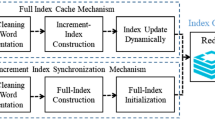Abstract
Caching is one of the most effective and commonly used mechanisms to improve performance of storage servers. Replacement policies play a critical role in the cache design due to the limited cache capacity. Recent researchers devote themselves to achieve high hit ratios, but rarely pay attention to reducing miss penalty during the design of a replacement policy. To address the issue, this paper presents a novel algorithm, called dual queues cache replacement algorithm based on sequentiality detection, which prefers to drop sequential blocks and protect random blocks. The buffer cache can serve more subsequent random read requests, so the cache miss penalty could be decreased significantly. Moreover, the algorithm makes use of two queues separately maintaining new blocks and old blocks to avoid the degradation of hit ratios. Our trace-driven simulation results show that it performs better than LRU and ARC for a wide range of cache sizes and workloads.
Similar content being viewed by others
References
Hu Y, Nightingale T, Yang Q. Rapid-cache-a reliable and inexpensive write cache for high performance storage systems. IEEE Trans Parall Distrib Syst, 2002, 13: 290–307
Muntz D, Honeyman P. Multi-level caching in distributed file systems-or-your cache ain’t nuthin’ but trash. In: Proceedings of the Winter 1992 USENIX Conference. San Francisco, 1992. 305–313
Adelsonveslkii G M, Landisand Y M. An algorithm for the organization of Information. Doklady Akademi Nauk, 1962, 16: 263–266
Aho A V, Denning P J, Ullman J D. Principles of optimal page replacement. J ACM, 1971, 18: 80–93
O’Neil E J, O’Neil P E, Weikum G. The LRU-K page replacement algorithm for database disk buffering. In: Proceedings of the 1993 ACM SIGMOD International Conference. Washington, 1993. 297–306
Lee D, Choi J, Kim J H, et al. LRFU: a spectrum of policies that subsumes the least recently used and least frequently used policies. IEEE Trans Comput, 2001, 50: 1352–1360
Belady L. A study of replacement algorithms for a virtual-storage computer. IBM Syst J, 1966, 5: 78–101
Zhao Y J, Xiao N. Bargain cache: using file-system metadata to reduce the cache miss penalty. In: Proceedings of the 9th PDCAT Conference. Dunedin, 2008. 177–184
Chu R, Xiao N, Zhuang Y Z, et al. A distributed paging RAM grid system for wide-area memory sharing. In: Proceedings of the 20th IPDPS Conference. Rhodes Island, 2006. 10–17
Mattson R L, Gecsei J, Slutz D R, et al. Evaluation techniques for storage hierarchies. IBM Syst J, 1970, 9: 78–117
Megiddo N, Modha D S. ARC: a self-tuning, low overhead replacement cache. In: Proceedings of the 2nd FAST Conference. San Francisco, 2003. 115–130
Johnson T, Shasha D. 2Q: a low overhead high performance buffer management replacement algorithm. In: Proceedings of the 20th VLDB Conference. Santiago de Chile, 1994. 297–306
Zhou Y Y, Philbin J F. The multi-queue replacement algorithm for second level buffer caches. In: Proceedings of USENIX Annual Technology Conference. Boston, 2001. 91–104
Jiang S, Zhang X D. LIRS: an efficient low inter-reference recency set replacement policy to improve buffer cache performance. In: Proceedings of the ACM SIGMETRICS Conference. Marina Del Rey, 2002. 31–42
Jiang S, Zhang X D. ULC: a file block placement and replacement protocol to effectively exploit hierarchical locality in multi-level buffer caches. In: Proceedings of the 24th ICDCS Conference. Tokyo, 2004. 168–177
Factor M, Schuster A, Yadgar G. Karma: know-it-all replacement for a multilevel cache. In: Proceedings of the 5th FAST Conference. San Jose, 2007. 169–184
Wong T M, Wilkes J. My cache or yours? Making storage more exclusive. In: Proceedings of the USENIX Annual Technical Conference. Monterey, 2002. 161–175
Gill B S. On multi-level exclusive caching: offline optimality and why promotions are better than demotions. In: Proceedings of the 6th FAST Conference. San Jose, 2008. 49–65
Liang S, Jiang S, Zhang X D. STEP: sequentiality and thrashing detection based prefetching to improve performance of networked storage servers. In: Proceedings of the 27th ICDCS Conference. Toronto, 2007. 550–559
Gill B S, Modha D S. SARC: sequential prefetching in adaptive replacement cache. In: Proceedings of the USENIX Annual Technical Conference. Anaheim, 2005. 293–308
Author information
Authors and Affiliations
Corresponding authors
Rights and permissions
About this article
Cite this article
Xiao, N., Zhao, Y., Liu, F. et al. Dual queues cache replacement algorithm based on sequentiality detection. Sci. China Inf. Sci. 55, 191–199 (2012). https://doi.org/10.1007/s11432-011-4213-z
Received:
Accepted:
Published:
Issue Date:
DOI: https://doi.org/10.1007/s11432-011-4213-z




